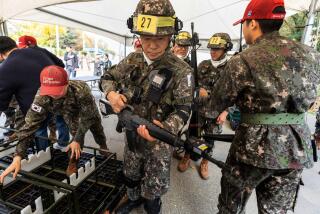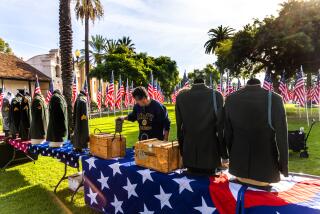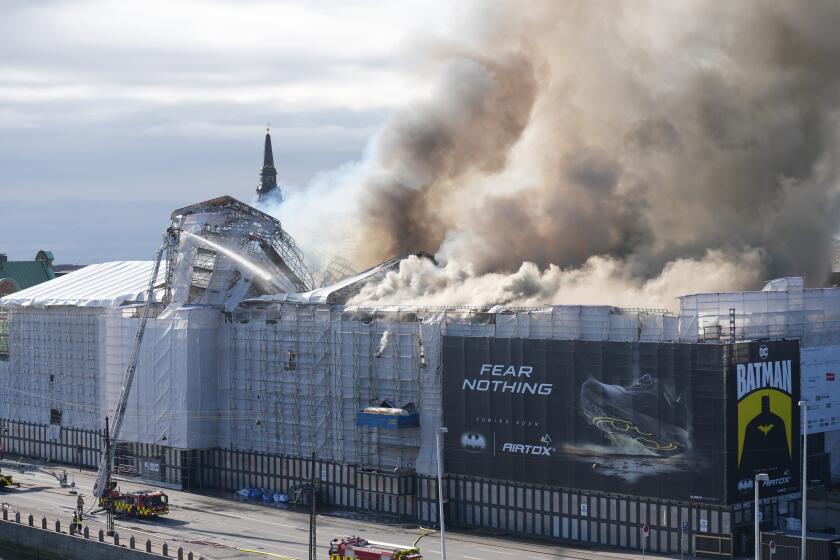Demands of war take toll on troops, families
Lucas Wallek was toiling at the family farm in Alice, Texas, when he decided to enlist in the Marine Corps, partly out of patriotism, partly from a desire to leave the familiar terrain of sagebrush and oil fields.
Through two tours of duty in Iraq, Wallek, 27, said he found a sense of purpose and camaraderie he had never experienced. His friends back home, he said, “don’t see the world the same way I do…. Sometimes it’s hard to be with them; it’s like I miss my Marines. We see the world the same way.”
Nathaniel Donnelly, who was part of the Marine push in Iraq that helped topple Saddam Hussein in the spring of 2003, said his time at war left him proud, yet also weary and afraid that he was being drawn further away from the civilian life he wanted one day.
Full coverage: A decade after 9/11
“Military service sets you apart — whether that’s positive or negative is up to the individual,” said Donnelly, 34. “With a lot of veterans, they seem to have a chip or really can’t relate to the civilian community. I see it all the time. Some guys just can’t get back on track.”
Wallek and Donnelly are among the men and women who in the wake of Sept. 11 have spent much of their adult lives at war.
Their worlds have been shaped by training and deploying, grieving the loss of comrades and recuperating from injuries, learning new techniques for killing and for staying alive.
Like the decade-long conflict in Vietnam, the wars in Iraq and Afghanistan have persisted so long that, in a sense, they have become a way of life.
And while many say being in the military has given them a sense of self, there is a nagging regret over the youth that they missed.
At a formative time in their lives, young volunteers enter a world of discipline and orderliness, leaving behind community, family and potentially a wider sense of life’s possibilities. “It’s a trade-off,” Donnelly said.
The demands of war have taken their toll — on the country, the military and families.
There have been more U.S. combat fatalities, more grievous wounds, more amputations, more cases of post-traumatic stress disorder than were imagined when President George W. Bush launched the war on terror.
More than 6,200 uniformed Americans have returned home in flag-draped coffins to the mortuary at Dover Air Force Base in Delaware; nearly 46,000 have received Purple Hearts.
For those who have made it home, suicide and divorce rates have been higher as veterans have struggled to deal with the memories of war and the pressures of civilian life.
More than 200,000 personnel remain deployed in or near the war zone. And even with a planned U.S. drawdown, the Marines have been told to expect deployments to Afghanistan through 2014, maybe longer.
::
Wallek, a rangy, 6-foot-2 sergeant with a reputation in his unit for volunteering for hard duty, readily admits that when he signed up for the Marines, he was looking for revenge for 9/11.
He joined the Corps in 2005 and trained as a machine gunner. He chafed to get into the war.
“I saw the death toll rising in Iraq and I figured it was my turn to get over there and get some,” Wallek said.
In his first combat deployment, he was shocked at the violence that unfolded around him. He remembers his tours as “scary and exciting; mostly scary.” He was in a convoy that hit a buried bomb.
“The vehicle commander was tore up pretty bad; I got a concussion,” he said in slow, precise tones.
After his two tours in Iraq, he transferred to another unit and is now aboard the amphibious assault ship Makin Island, preparing for deployment with the 15th Marine Expeditionary Unit to an unspecified location.
Over time, revenge has faded in his mind. He’s a squad leader now, a mentor to young Marines, and his tone is more even-tempered: There is a mission out there that must be accomplished.
“War is one of those things that have to be done for the greater good, but it’s one of the most horrible experiences you can go through,” he said. “I’m glad I did it for our country, for our Corps, and for myself. We were serving a purpose over there, not just for the United States but for the Iraqi civilians.”
He knows that by enlisting he missed out on a more carefree life, but he has no regrets. When he goes home, he notices that his buddies seem to take things for granted and don’t realize the dangers of the world.
“I love my friends dearly, but after a while I can’t wait to get back with Marines,” he said.
But the day will come when Wallek leaves the Corps. And that future is bright: He’s married to a graduate student at Texas A&M University. They have a 4-year-old son.
Still, he said, “if I get out, I know I’ll miss the brotherhood we have in the Marine Corps.”
The burden of service has weighed most heavily on families.
Marine Staff Sgt. Michael Weber, 28, has deployed three times: twice to Iraq, once to Afghanistan. He said he probably would have made even more deployments except for a three-year stateside assignment working as a rifle range instructor.
“I was trying to make my first marriage work,” he said with a mix of humor and sadness.
At the height of the Iraq war, Marines referred to their lives as seven-and-seven: seven months in Iraq, then seven at home, then seven back in Iraq.
The result was a kind of dual existence in which Weber said his mind was constantly torn between family and duty.
“The invasion [in 2003] was the worst for the family, one letter home in a month,” Weber said. “It’s better now with satellite phones and email, but it’s still tough on families.”
He’s remarried and hoping again to deploy. Years of packing 100-plus pounds of gear over miles of rutted roads have left him with back problems. Until the doctor gives the OK, he’s got desk duty at Camp Pendleton.
“As much as nobody likes wars, I’d go back in a heartbeat to be with my brothers,” Weber said. “For the infantry, wartime is the only time you get to do your job for real — a chance to see how you react.”
Donnelly, who had enlisted in the Marines out of high school before Sept. 11, said there is a consuming quality to war. It is what you spend all your time training for and provides a focus that few civilians understand. It is a kind of addiction that is hard to shake, even after leaving the service.
He was on guard duty at the United States embassy in Costa Rica on 9/11 and hoped he would be assigned to the assault on the Taliban government in Afghanistan in late 2001. That didn’t happen, but he was overjoyed to be part of the push into Iraq.
After the fall of Baghdad, Donnelly decided that eight years in the Marine Corps was enough. He had fought his war and — he thought — helped the U.S. win a quick knockdown. A sergeant, he opted not to reenlist.
He enrolled in college and “tried to get into nonveteran things: student government, honor society, business society. I wanted to broaden my identity.” Too many veterans cling to their military status “like a guy holding on to an old girlfriend who really doesn’t want you anymore,” he said.
While at San Diego State, he helped found the Student Veterans Organization, not to swap war stories or complain that civilians don’t understand them but rather to help veterans navigate the sometimes byzantine world of financial aid and graduation requirements.
In 2005, as the war flared anew in Iraq, Donnelly considered returning to the military as an officer. He was blocked by a medical condition; looking back, he is not upset about the rejection.
He is now pursuing a masters in business administration and hopes to land a job in international development. Military service does offer a unique camaraderie, he said, but it also can limit someone’s ability to see other ways of thought or to relate to people who have never worn a uniform or fired a rifle.
“I was proud of my service, but I knew I had to get back to regular American society,” he said.
For many soldiers, the scars of war will persist and their thoughts will linger on the most intense experience of their lives. Many also will carry a renewed appreciation of the precious commodity that is life and peace.
Robert Parry, 39, a marketing director for a Newport Beach investment firm, deployed with the California Army National Guard to Kuwait after the 9/11 attacks and later served in combat in Iraq and Afghanistan. In Iraq, Parry was with a Guard unit that lost 17 soldiers in action.
Now a captain, he said leading soldiers in battle brought a sense of fulfillment and achievement. “It’s a truth that civilians cannot understand,” he said. “They talk as if deployment is a bad thing.”
But after returning to USC to pursue his MBA, he felt like “a heart-attack survivor” — as if he had won a second start on life.
“The trees seem greener, the sky more blue,” Parry said. “Things that used to bother me didn’t matter as much.”
Full coverage: A decade after 9/11
More to Read
Start your day right
Sign up for Essential California for news, features and recommendations from the L.A. Times and beyond in your inbox six days a week.
You may occasionally receive promotional content from the Los Angeles Times.






